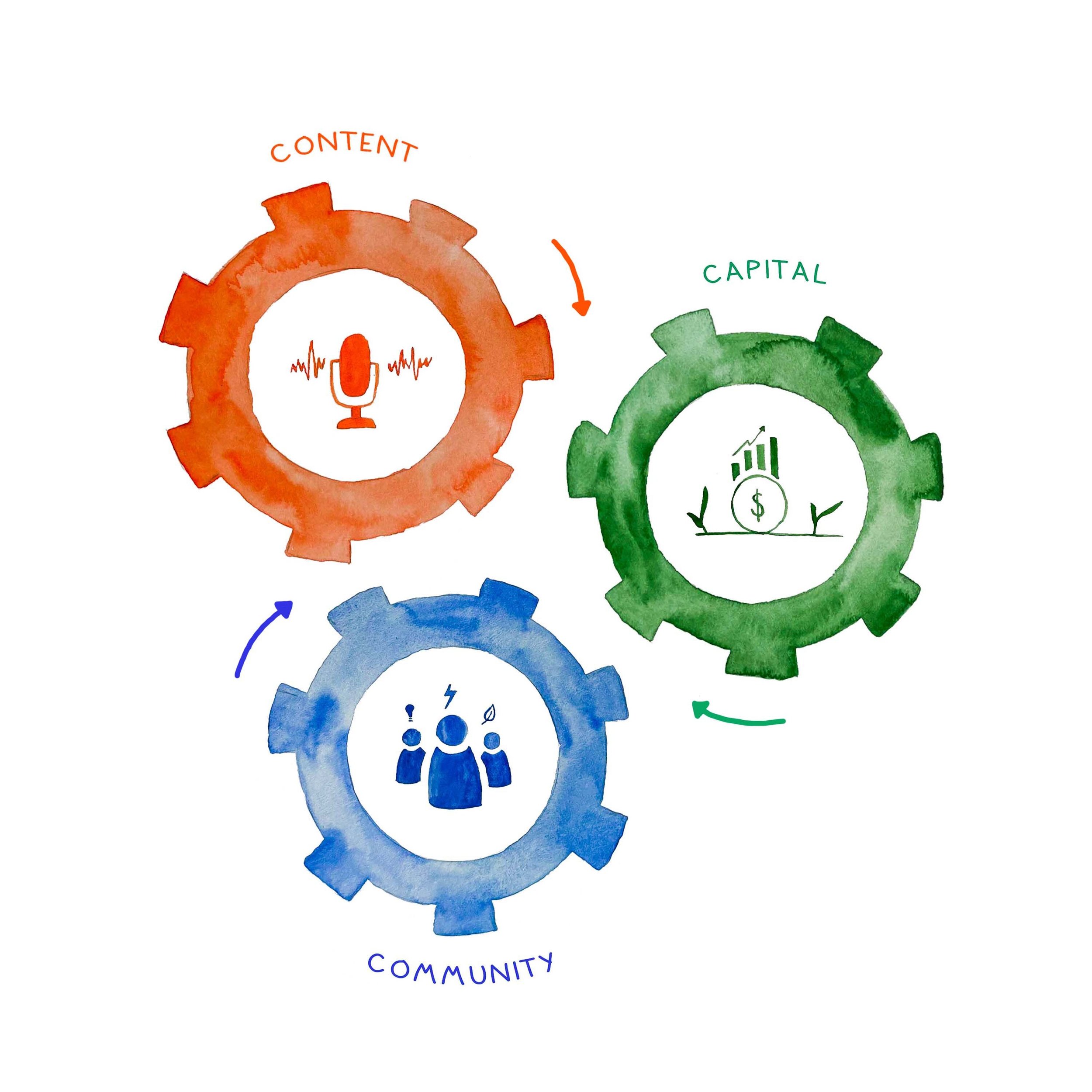Q3 2022 DEI Report
MCJ powers collective innovation for climate solutions by breaking down knowledge silos and unleashing problem-solving capacity. We’re a platform for the flow of information, ideas, and capital needed to accelerate individual climate journeys and enable collaboration. We do this because we believe that we all have a responsibility to step up and do something about the climate crisis. Ensuring that richness and diversity of thought can flow is a key principle for MCJ. This is where our team spends a lot of our time – designing a space where similar and differing perspectives are embraced.
MCJ Flywheel, illustrated by Nicole Kelner
We build diversity of thought by giving the power of the mic and pen to voices from all parts of the climate economy, not just white collared tech workers. We strive to invest in founding teams who believe that inclusion and equity builds stronger, more profitable companies; we learn and lean into investments in new geographies. We, alongside incredible leaders from the community, create a welcoming digital and IRL place where non-binary folks can feel just as welcome as cis folks and a place where innovators from Lagos, Bangalore, and Abu Dhabi can be equal participants in establishing and contributing to the climate tech dialogue as folks in San Francisco or Boston are. An ecosystem made up of different perspectives and backgrounds helps us break down knowledge silos faster – so we can get to solutions faster.
Earlier this year, we looked at our venture fund portfolio to understand our capital deployment diversity baseline (see public Q1 2022 LP report here). We have spent Q2 and Q3 gathering and analyzing data across all three pillars of MCJ Collective’s flywheel: content, capital and community.
You can access the full MCJ Collective Q3 2022 DEI report here.
Here’s a brief summary…
Across the podcast and newsletter channels, we began collecting data to better understand the gender, racial, and ethnic diversity of contributors. In Q3, we sent a survey to 311 past podcasts guests and 44 Community Voices contributors and learned that 33% of contributors identify as non-male and 38% of contributors identify as non-white or multiracial. Based on this data, our Community Voices contributors are more gender and racially diverse than the guests on My Climate Journey podcast. This breakdown offers a clearer picture of the voices we’ve amplified throughout our content ecosystem. We are working to define and invite contributors across dedicated conversations about DEI themes, including environmental and climate justice – as exemplified in a new skilled-labor workforce series on the podcast with guests who are speaking to topics like workforce transition for marginalized communities and Indigenous regenerative agricultural practices.
In our core fund, which has invested in 72 companies, the percentage of deployed capital going to all female-identifying founding teams is at 5.7% in Q3 compared to the industry average1 of 2.8%. The percentage of deployed capital going to mix-gender founding teams is 14% in Q3, compared to the 12% industry average2. We are tracking new metrics like the percentage of companies with female CEOs (13%) and capital deployed to these companies (9.8%) to form a new baseline for ourselves. Similarly, we are also starting to track percentage portfolio companies with all historically excluded founders3 (28%) and capital deployment to these companies (28%). We’ve diversified our geographic presence: within the past few quarters we’ve made our first investments into Asia and Africa-based companies. We have also implemented internal DEI and ESG policies – each of which we aim to share publicly for comment to further solidify and hold ourselves accountable to inclusion and impact on our investments. We’re also actively meeting more historically excluded founders through outreach, introductions from the community and making ourselves available for office hours dedicated to historically excluded founders.
Many of the podcast listeners, newsletter subscribers and fund LPs become community members. As the community has grown, we’ve conducted 2 annual community surveys (July 2021, 1.5K members vs. July 2022, 2.3K members) to better understand its demographic composition. There are two high level takeaways: non-male identifying respondents increased from 27% to 33% and the community continues to be skewed white, though dropping slightly from 78% to 76%. We are both encouraged to see the changes in gender and ethnic diversity, incremental as they are, and feel urgency to do more in scaling this growing ecosystem to be more inclusive and welcoming.
In the spirit of continued transparency, we are publishing this report to give a pulse of what we’re learning and our upcoming plans to further diversity, equity and inclusion in what we do. As always, please let us know your feedback (info@mcjcollective.com) as we are on a learning journey.
Sincerely,
The MCJ team

